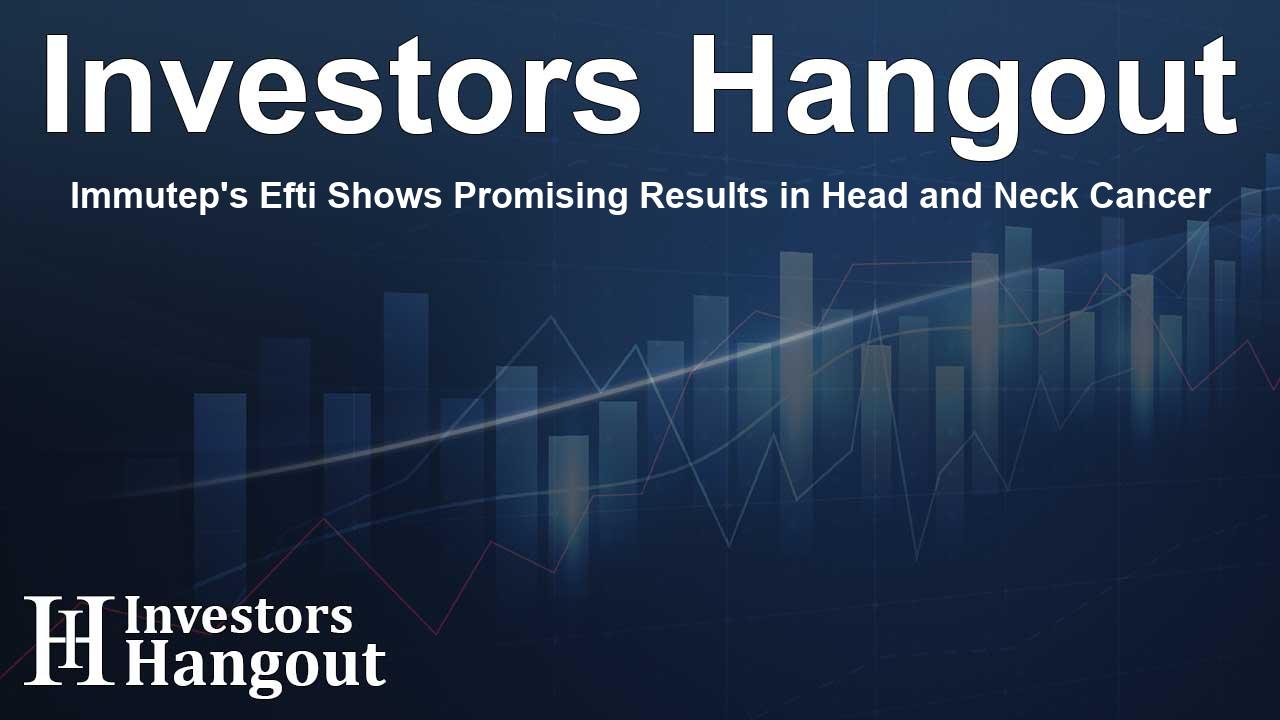Immutep's Efti Shows Promising Results in Head and Neck Cancer

Promising Efficacy of Efti and KEYTRUDA in Head and Neck Cancer
Recently presented at a major international medical conference, important follow-up results from a pivotal clinical trial are making waves in the oncology community. This trial, referred to as TACTI-003, evaluated the combination of eftilagimod alpha (known as efti) from Immutep and KEYTRUDA from MSD as a treatment for patients with recurrent or metastatic head and neck squamous cell carcinoma (HNSCC).
Key Findings from the TACTI-003 Trial
The findings from the trial, previously shared on various occasions, were again highlighted in a Proffered Paper presentation at the ESMO Congress 2024. Lead researcher Claus Kristensen took to the stage to share that efti in combination with KEYTRUDA showcased a remarkable objective response rate (ORR) of 32.8% when considering patients with any PD-L1 expression, representing a significant enhancement compared to the 26.7% observed with KEYTRUDA alone.
High Response Rates for Patients with High PD-L1 Expression
Delving deeper into the data, patients with high PD-L1 expression (CPS ?20) demonstrated an even more impressive ORR of 31.0%. This is encouraging for this group of patients often facing limited options. Efti’s combination therapy yielded even more success, with a complete response rate reported at 6.9% against 3.7% for the single-agent KEYTRUDA therapy.
Durability of Treatment Response
One of the successful attributes of efti is the durability it offers to patient responses. The median duration of response (DOR) was reported at 17.5 months for patients receiving the combination treatment, a number that aligns favorably compared to known historical responses. In contrast, other combinations generally produce much shorter DOR intervals, typically around 6 to 7 months when coupled with chemotherapy.
Biological Activity and Immune Response
A noteworthy aspect of the data from this trial is the significant increase in the absolute lymphocyte count (ALC) in those treated with efti in combination with KEYTRUDA. A positive immune response is seen as a critical biomarker, making this finding especially valuable as it suggests enhanced biological activity in patients receiving the combination therapy.
Safety Profile Remains Favorable
When it comes to safety, the combination continues to exhibit a good safety profile, with new safety signals remaining absent. Rates of treatment discontinuation due to adverse events were comparable between both treatment groups, showcasing promising tolerability. Additionally, the combination therapy carries a similar safety risk as KEYTRUDA alone, aside from minor injection site reactions expected from efti’s delivery method.
Looking Ahead for Regulatory Engagement
As the company moves forward, engaging with regulatory agencies to discuss the next steps based on this compelling data will be critical. Immutep anticipates that overall survival evidence will be available by 2025, further informing treatment approaches in this challenging disease area.
The Future of Oncology and Immutep
Immutep's commitment to transforming cancer treatment continues to shine through its innovative development of efti. By enhancing the immune response in combination with immune checkpoint inhibitors like KEYTRUDA, Immutep is aiming to change the landscape for patients suffering from cancers with high unmet needs. Their ongoing dedication to research and regulatory engagement will hopefully pave the way for new therapeutic alternatives that could significantly improve patient outcomes.
Such trials and studies not only add to the existing knowledge but also inspire hope in patients and healthcare professionals alike. The journey of efti underlines the importance of continuous research and the exploration of novel treatment avenues in the fight against cancer.
Frequently Asked Questions
What is the main focus of the TACTI-003 trial?
The TACTI-003 trial focuses on evaluating the efficacy and safety of eftilagimod alpha (efti) in combination with KEYTRUDA as a first-line treatment for recurrent or metastatic head and neck cancer.
What were the reported objective response rates (ORR) for efti with KEYTRUDA?
The combination therapy achieved an ORR of 32.8% in patients with any PD-L1 expression and 31.0% for patients with high PD-L1 expression (CPS ?20).
How does the duration of response compare to other treatments?
The median duration of response for the combination of efti and KEYTRUDA was 17.5 months, which is significantly longer than the typical 6 to 7 months seen with traditional combinations involving chemotherapy.
What safety considerations were noted in the trial?
The trial reported no new safety signals for the combination, and the treatment discontinuation rates due to adverse events were low and similar between the combination and single-agent therapies.
How does this research impact future cancer treatment developments?
This research represents significant progress in developing immunotherapy combinations that enhance treatment efficacy and safety, potentially leading to broader treatment options for patients with various cancers.
About Investors Hangout
Investors Hangout is a leading online stock forum for financial discussion and learning, offering a wide range of free tools and resources. It draws in traders of all levels, who exchange market knowledge, investigate trading tactics, and keep an eye on industry developments in real time. Featuring financial articles, stock message boards, quotes, charts, company profiles, and live news updates. Through cooperative learning and a wealth of informational resources, it helps users from novices creating their first portfolios to experts honing their techniques. Join Investors Hangout today: https://investorshangout.com/
Disclaimer: The content of this article is solely for general informational purposes only; it does not represent legal, financial, or investment advice. Investors Hangout does not offer financial advice; the author is not a licensed financial advisor. Consult a qualified advisor before making any financial or investment decisions based on this article. The author's interpretation of publicly available data shapes the opinions presented here; as a result, they should not be taken as advice to purchase, sell, or hold any securities mentioned or any other investments. The author does not guarantee the accuracy, completeness, or timeliness of any material, providing it "as is." Information and market conditions may change; past performance is not indicative of future outcomes. If any of the material offered here is inaccurate, please contact us for corrections.